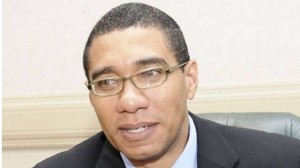 Prime Minister Andrew Holness yesterday delivered a sobering message at the World Leaders Summit at the start of the global climate conference in Glasgow, telling delegates the same urgency with which the world has responded to the novel coronavirus pandemic needs to be applied to the climate crisis.
Prime Minister Andrew Holness yesterday delivered a sobering message at the World Leaders Summit at the start of the global climate conference in Glasgow, telling delegates the same urgency with which the world has responded to the novel coronavirus pandemic needs to be applied to the climate crisis.
“The pandemic has demonstrated that the world has the capacity to develop global solutions in record time when we believe and agree that the problem threatens safety and security,” said the Jamaican prime minister, who was one of more than 120 heads of state and government to address the conference.
“Here at COP26, in the context of a pandemic, the message is clear: Climate remains a pre-eminent priority for global action. As we have come to appreciate with the pandemic, no one is safe until everyone is safe. All countries must act responsibly and with ambition to preserve our climate for current and future generations,” he added.
Holness said, too, that the pandemic has also demonstrated the need for equity, another requirement in the response to climate change.
“Countries that have profited the most from carbon over decades have a responsibility to make resources and technology available to others to adapt and transition to low-carbon economy,” he argued.
His position was not unlike the ‘polluter must pay’ arguments made by leaders of other developing states, including Sri Lankan President Gotabaya Rajapaksa, Kenyan President Uhuru Kenyatta, Antigua & Barbuda Prime Minister Gaston Browne, and Barbados Prime Minister Mia Mottley who labelled it “immoral and unjust” for rich countries not to provide financing for loss and damage experienced by climate events.
“This was the basis of the 2009 US$100-billion per year pledge which still needs to be met if the developing world is to achieve our resilience and low carbon emission goals,” Holness said.
“If we are to have any realistic chance of meeting our climate ambitions, we need financing that is predictable, less fragmented, and easier to access…[but] the greater need is for funding for loss and damage which is necessary for our protection and recovery from disasters as well as for adaptation,” he continued.
In addition to the PM, the Jamaican delegation at COP26 includes Foreign Affairs Minister Kamina Johnson Smith, Finance Minister Dr Nigel Clarke, and Environment and Climate Change Minister Pearnel Charles, Jr. They complement the core negotiating team drawn from the Climate Change Division, other high-level technical experts from within Government, and representatives from academia, the private sector, civil society, and youth organisations.
COP26 is being presided over by the United Kingdom, with support from Italy. Its broad goals are to:
1) Halve emissions by 2020 and achieve net zero carbon emissions by 2050 to limit global temperature increase to 1.5 degrees Celsius above pre-industrial levels.
2) Minimise loss and damage from the impacts of climate change.
3) Raise and deliver US$100 billion per year to developing countries to support climate action,
4) Finalise the rules governing the implementation of the Paris Agreement (the Paris Rulebook).
